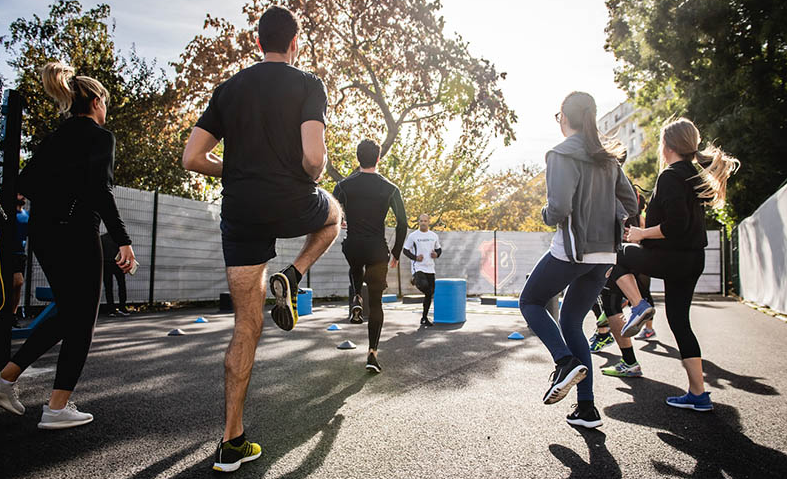When is the best time for regular exercise? Is it the morning after waking up? Or in the afternoons and evenings, when you’ve finished all your activities and then take the time to get some exercise? To make training more effective and healthy, you need to know important factors, one of which is the alarm that the muscles of the body have.
One study states that the body’s muscles and framework have their own time and alarm to determine when to exercise and when to stop. Then which of the 24 hours you have in a day is the right time to exercise?

Find out the best time to exercise, according to research
Did you know that all cells in the body have their clocks and schedules to perform each task? The natural internal clock, also known as the circadian rhythm, has the function of directing the body when to eat, sleep, wake up, or perform various other functions.
So when you have 24 hours a day, the body automatically regulates and determines the time for eating and other activities. All cells in the body have a circadian rhythm, including the muscles that you use to perform various activities.
A study by researchers at Northwestern University states that the muscles’ circadian rhythm makes all the movements they produce more effective. To determine the best time to train, it is therefore important to know the natural clock of the muscles.
-
Morning exercises make activities feel fresher
Exercising in the morning has become a common thing and is widely practiced by various groups due to its health benefits.
A study in the Journal of Physiology tested 100 people to determine the effect of exercise time on affecting circadian rhythms over the following days. Through this research, it is known that exercising at 7 am can help you start activities earlier the next day.
This means you’ll feel refreshed throughout the day and wake up to an earlier workout than you would with an afternoon or evening workout.
Before breakfast is the best time for morning exercise, as it can burn up to 20 percent more fat. However, if you are afraid of the rapid loss of energy during exercise, fill your stomach about 2 hours in advance. This will prevent abdominal pain from occurring during exercise.
-
Exercise during the day is more effective for body condition
A study in the journal Cell Metabolism performed experiments on mice to see if muscles had a natural clock for activity. As a result, it was found that rats walked around spinning toys more actively when they did so at night. Rats are nocturnal animals, or rather nocturnal.
Based on these results, the researchers concluded that genes are involved in regulating the rat’s circadian rhythm to work very effectively at night. The human body also has this mouse gene. On the other hand, humans are more active during the day. Researchers, therefore, assume that people will move more effectively during the day.
If you want to exercise during the day, you should do it between 2:00 p.m. and 6:00 p.m. During this time, your body temperature is at its highest, which can optimize muscle function and strength, enzyme activity, and endurance during exercise. Avoid exercising in the middle of a very hot day as it can be quite dangerous for the body.
-
Exercise in the afternoons and evenings when you are very busy with activities
If you are indeed very busy and don’t have the right time to exercise in the morning, there is no problem doing this physical activity in the afternoon or evening. If you want to exercise longer without worrying about conflicts with other activities, the afternoon or evening might be the best time for you.
Other research shows that these afternoon or evening exercises can improve a person’s sleep quality. A survey by the National Sleep Foundation found that 76-83% of people who exercised before bed had a better improvement in sleep quality than those who didn’t exercise at all.
In addition, the body has the fastest reaction time in this time frame, which makes it suitable for HIIT training (High-Intensity Interval Training). But you can also do other sports such. B. exercise brisk walking or jogging to increase the heart rate, which falls in the afternoon to evening, again.
When is the best time to exercise?
To date, there are no definitive studies or benchmarks that state the best time to exercise. People who have trouble getting up in the morning will find it difficult to exercise in the morning. Meanwhile, nighttime exercise, which research shows can improve sleep quality, may even make it harder for some people to fall asleep.
Aside from when you should exercise, the American Heart Association places more emphasis on consistency as your key to experiencing the benefits of exercise. Therefore, it is important to choose sports activities that you prefer to be more motivated.
Exercising is better than not exercising at all. There are different types of exercises you can do throughout the day, including:
- walking, jogging, and running,
- swimming,
- cycling,
- Aerobics or dancing (dancing),
- Going up and down stairs,
- Strength training and weight lifting,
- Yoga or Pilates,
- Boxing or Kickboxing and
- Martial arts such as karate, taekwondo and pencak silat.
After choosing the right type and time to exercise, now is the time to do it consistently. To reap the benefits of fitness training, do at least 150 minutes a week, or 30 minutes five days a week.
You must also balance this physical activity with the intake of healthy and balanced foods. Always follow a healthy lifestyle, such as B. Quitting smoking, avoiding alcohol, and getting enough rest.
In addition, with certain health problems, it is better to consult a doctor to determine the type and time of allowed exercises.
